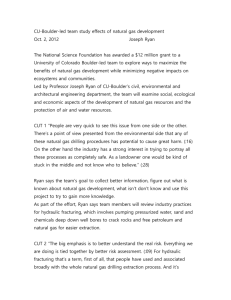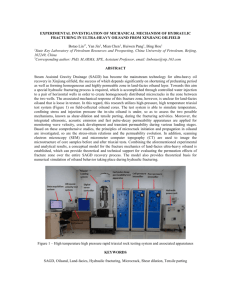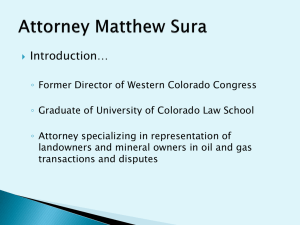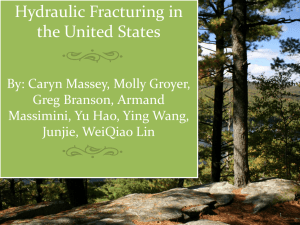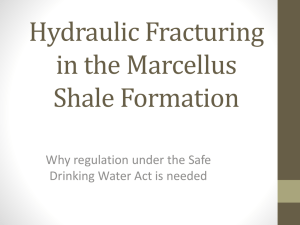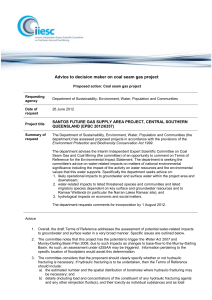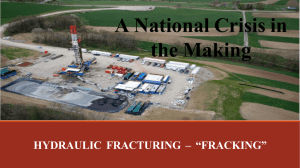Fracking Ballot Talking Points
advertisement
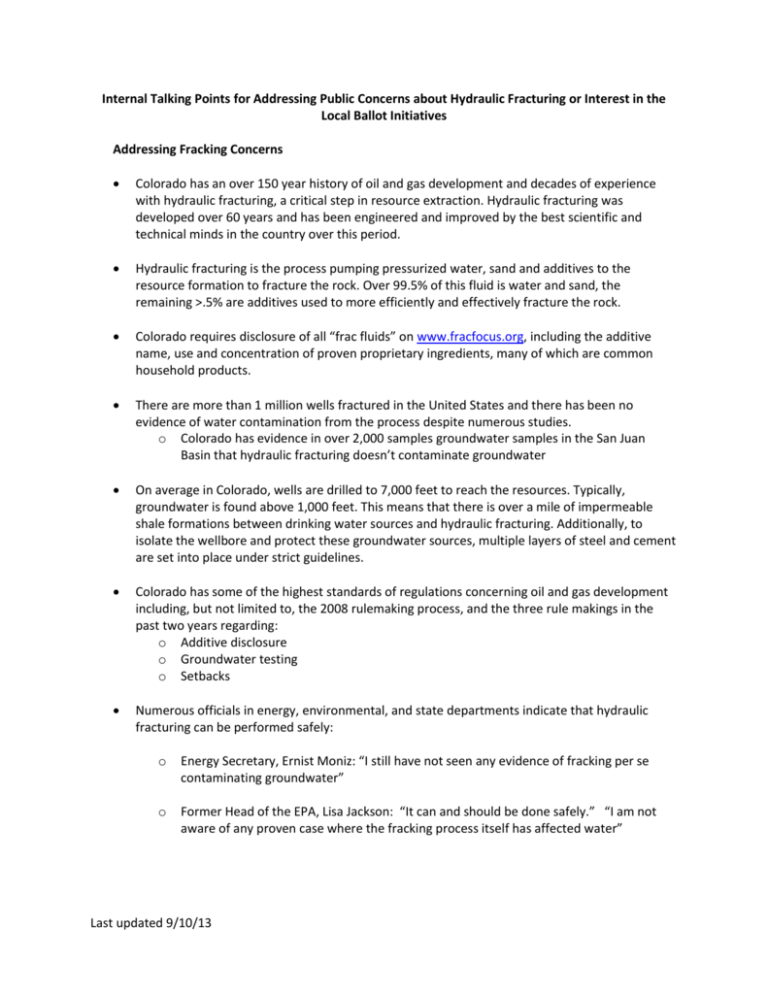
Internal Talking Points for Addressing Public Concerns about Hydraulic Fracturing or Interest in the Local Ballot Initiatives Addressing Fracking Concerns Colorado has an over 150 year history of oil and gas development and decades of experience with hydraulic fracturing, a critical step in resource extraction. Hydraulic fracturing was developed over 60 years and has been engineered and improved by the best scientific and technical minds in the country over this period. Hydraulic fracturing is the process pumping pressurized water, sand and additives to the resource formation to fracture the rock. Over 99.5% of this fluid is water and sand, the remaining >.5% are additives used to more efficiently and effectively fracture the rock. Colorado requires disclosure of all “frac fluids” on www.fracfocus.org, including the additive name, use and concentration of proven proprietary ingredients, many of which are common household products. There are more than 1 million wells fractured in the United States and there has been no evidence of water contamination from the process despite numerous studies. o Colorado has evidence in over 2,000 samples groundwater samples in the San Juan Basin that hydraulic fracturing doesn’t contaminate groundwater On average in Colorado, wells are drilled to 7,000 feet to reach the resources. Typically, groundwater is found above 1,000 feet. This means that there is over a mile of impermeable shale formations between drinking water sources and hydraulic fracturing. Additionally, to isolate the wellbore and protect these groundwater sources, multiple layers of steel and cement are set into place under strict guidelines. Colorado has some of the highest standards of regulations concerning oil and gas development including, but not limited to, the 2008 rulemaking process, and the three rule makings in the past two years regarding: o Additive disclosure o Groundwater testing o Setbacks Numerous officials in energy, environmental, and state departments indicate that hydraulic fracturing can be performed safely: o Energy Secretary, Ernist Moniz: “I still have not seen any evidence of fracking per se contaminating groundwater” o Former Head of the EPA, Lisa Jackson: “It can and should be done safely.” “I am not aware of any proven case where the fracking process itself has affected water” Last updated 9/10/13 o Colorado Governor John Hickenlooper: “You can’t harvest the mineral rights without doing hydraulic fracturing, which I think we’ve demonstrated again and again can be done safely.” Numerous studies have been done by state and federal regulators, scientists, and other watchdog groups to address concerns over water and air contamination, with all of them refuting the notion that hydraulic fracturing causes groundwater contamination. Most recently, the US Department of Energy found no correlation between hydraulic fracturing and water contamination and recent data released indicates that the US is emitting less CO2 than it has in 20 years thanks to burning more natural gas and less coal. Additionally, recent analysis in Erie, Colorado, indicates that emissions within the town and near well heads do not pose a health risk. o "The monitored concentrations of benzene, one of the major risks driving chemicals, are well within acceptable limits to protect public health, as determined by the U.S. Environmental Protection Agency," – Pinyon Environmental Inc. A Ban is Not a Plan Several Front Range communities are considering over-reaching bans or extended moratoria on oil and gas development. This is a short term tactic to ban all oil and gas development. Ultimately it is a distraction from constructive dialog about the potential impacts and benefits from all forms of energy development, including oil and gas. All Coloradoans and our visitors rely on oil and gas in various forms every day; it’s how we cook our meals, enjoy Colorado’s parks and activities and provide our modern health care. In fact, even our exciting and robust tourist economy is heavily supported by products of oil and gas development. Not only does this industry provide gasoline for cars to travel everywhere from the art museum to the mountains, but nearly all recreation equipment from carbon bicycles, to water proof jackets, skis, shin guards and helmets, tents and even hiking boots can't be made without oil and natural gas. Banning “fracking” means higher energy prices. The working poor and the middle class will suffer most under a regime that bans extraction of oil and gas. The shale revolution has saved the poor billions of dollars spent to heat their homes and apartments. A recent report from IHS found that the average American household gains $1,200 in disposable income thanks to surging U.S. oil and natural gas production in the savings from utility bills and cheaper prices on a number of services and goods. The plan to ban will disenfranchise the middle class by making choices between every day necessities such as food, heat and medicine more difficult. Oil and gas tax revenue streams are tied into the fabric of Colorado living, and provide significant funding for road repairs, fire districts, school districts, parks, and many more services that support our way of life. In 2012 alone, $1.6 billion went to state coffers from our industry, with an estimated $500 million going directly to education. Last updated 9/10/13 By placing a ban on hydraulic fracturing, 111,000 working men and women and their families are being put at risk and it sends the message that Colorado is not open for business. This is not the Colorado way. Colorado is a safe harbor for open dialogue, reasonable regulations and responsible energy development. We must implement a common sense approach to doing business in Colorado by relying on scientific evidence and facts, not hyperbole, scare tactics or sensationalism. Sources and real data and examples matter. Natural gas is vital to our energy security and our energy plan moving forward: o President Obama: fracked natural gas ‘can provide not only safe cheap power, but it can only help reduce our carbon emissions.’ o Natural gas burns 50% cleaner than coal, with much lower sulfur and nitrogen emissions with none of the toxic mercury. It is the common sense choice for our base load power switch o Carbon Dioxide emissions are at the lowest in 20 years, thanks largely in part to switching from coal fired generation to natural gas. o Oil imports are at record lows, as the United States has options of producing at home, and importing from stable nations, we can move away from volatility from supply shocks and turmoil abroad. Fundamentally, a ban on hydraulic fracturing is a ban on oil and gas development in Colorado. And it begs the question: if not here then where? Energy experts from fossil fuel and renewable backgrounds both agree that natural gas is the best energy option for providing the needed backup for solar and wind for when the sun does not shine and when the wind does not blow. A drilling ban is an extreme option put forth by many national environmental groups, and it is their goal to slow down domestic oil and gas production by implementing bans. They are achieving this by using junk science and untrue claims. Our community should do its part to help the nation meet its energy needs and wean ourselves from unstable regimes. Last updated 9/10/13
